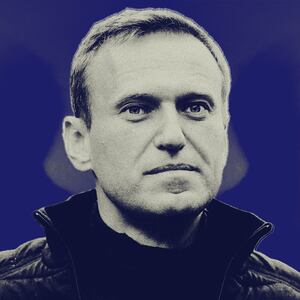A prisoner swap deal to free Alexei Navalny and two U.S. nationals was close to being agreed just before the Russian opposition leader died in prison, a Navalny ally claimed Monday.
Maria Pevchikh, a director of Navalny’s Anti-Corruption Foundation, said in a video message that the trio would be swapped for Vadim Krasikov, an FSB assassin currently jailed in Germany. “I received confirmation that negotiations were at the final stage on the evening of February 15th,” Pevchikh said. “On February 16th, Alexei was killed.”
She added that Navalny was “supposed to be free in the coming days because we have achieved a decision on his exchange” and that Russian President Vladimir Putin had been offered the deal in early February. Navalny died while imprisoned in an Arctic penal colony—his supporters say that his death certificate states that his demise was caused by natural causes.
While Pevchikh did not say which Americans were included in the proposed deal to free Navalny, the Biden administration says it has been attempting to free U.S. Marine veteran Paul Whelan and Wall Street Journal reporter Evan Gershkovich, both of whom are in Russian prisons.
She said that Navalny’s allies had been working on ways to free him since the beginning of the full-scale invasion of Ukraine two years ago, pursuing a plan of securing his liberty in a prisoner swap involving “Russian spies in exchange for political prisoners.” “Officials, American and German, nodded understandingly, talked about how important it was to help Navalny and political prisoners, shook hands, promised, and did nothing,” she claimed, saying the plan made slow progress.
Pevchikh said Navalny’s allies even resorted to contacting “Putin’s friends like Henry Kissinger,” in an effort to establish a channel of communication with the Kremlin, but that the late diplomat “didn’t help.” But she says that despite the setbacks, the plan was approved last spring.
“Everything could have happened then, a year ago. But it didn’t,” Pevchikh said. “It was an endless game of broken telephone.”
She said that “fragments” of the proposed deal even made it into the public eye, pointing to a Wall Street Journal article in September that claimed Moscow had brought up Krasikov’s name in prisoner swap negotiations. The article said the assassin—who carried out the shocking daylight murder of Chechen insurgent leader Zelimkhan Khangoshvili in Berlin in 2019—had become “central” to American attempts to secure the release of Gershkovich and Whelan. It added that a multilateral deal was possible in which Russian detainees in Western countries were freed in exchange for Westerners held in Russia, “as well as imprisoned dissidents such as Alexei Navalny.”
Pevchikh also mentioned that Putin had hinted that he wanted Krasikov to be freed when he was asked about the possibility of Gershkovich’s release during an interview with Tucker Carlson.
“After Alexei’s murder, I was told that Roman Abramovich was the one who delivered the proposal to swap Navalny to Putin,” Pevchikh said. Abramovic, the billionaire Russian oligarch who used to own Premier League soccer team Chelsea, was established as “an informal negotiator communicating with American and European officials, and at the same time representing Putin; an unofficial channel of communication with the Kremlin,” Pevchikh claimed.
She said she asked Abramovich through “mutual acquaintances” about when and how he gave Putin the proposal, and what Putin’s response had been. “Unfortunately, Abramovich did not answer these questions,” she said. “But he did not deny anything either.”
“I tell this story so that you have an answer to the question ‘why was Navalny killed now?’” she added, reiterating her view that Navalny was actually murdered on Putin’s instruction. “Putin was clearly told that the only way to get Krasikov is to exchange him for Navalny. ‘Hold on,’ thought Putin. ‘I can’t tolerate Navalny being free. And since they are willing to exchange Krasikov on principle, then I just need to get rid of the bargaining chip, then offer someone else when the time comes.’”
“It’s absolutely illogical, absolutely irrational, it’s the behavior of a mad mafioso,” Pevchikh said, adding that Putin had “gone mad with hatred for Navalny.” “Putin hates him so much that he acts to his own detriment and against his own rational interests,” she said, claiming that the Russian president feared Navalny’s political potential and his anti-corruption investigative work.







